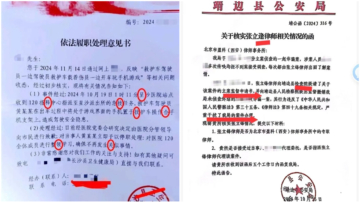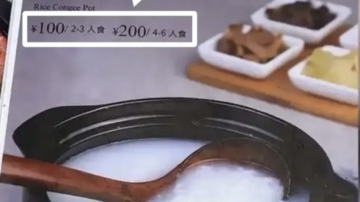【新唐人2013年01月15日讯】最近大陆媒体揭示了一份2012媒体关注度10大榜单。榜单罗列了《中央电视台》新闻联播节目使用频率最高的“十大成语”,其中都是“坚定不移、长治久安”等歌颂中共当局的词汇。这被专业人士看作是大陆媒体人为了逃避审查,被迫采用这类复杂隐晦的表达方式,对官方喉舌《新闻联播》进行嘲讽。下面请看本台记者的报导。
大陆《中国青年报》报导,中国传媒大学有声媒体语言监测与研究中心和中国广播电视年鉴,联合发布2012媒体关注度10大榜单,其中包括10大新闻热点等19类媒体最关注榜单。与官媒《央视》新闻联播节目直接相关的榜单共有5类。
其中,《新闻联播》最常使用的10大成语榜单中,“继往开来”和“坚持不懈”首次进入榜单,而“坚定不移”、“一如既往”、“前所未有”、“长治久安”、 “与时俱进”、“实事求是”、“来之不易”和“丰富多彩”等成语继续位列10大成语。
这一报导引来网民的关注和围观。有网友用“胡说八道”来为《新闻联播》注解。
也有网友列出一份自创的10大成语,用弄虚作假、恬不知耻、指鹿为马、粉饰太平、丑态百出等来讽刺《新闻联播》。
大陆网友张建中:“官媒不也讲了嘛,新年献词讲了:努力说实话。 以前没说过实话,所以在新的‘继往开来’当中要说‘实话’。这透露出好些(好多)信息。”
网友张建中举例说,现在富士康员工上街抗议的事情官媒根本不报导,但对于退休金上涨100元钱的事情,官媒则全力报导,大肆忽悠,虽然这100元根本抵不上物价的上涨。
大陆网友钱先生也向《新唐人》表示,《央视》是中共当局对老百姓进行洗脑的一个工具,电视节目中充满了谎言与欺骗。
大陆网友钱先生:“新闻联播我们都知道,它是共产党的喉舌,对它都没法评论。我对他们这些言语、这些词汇感觉到噁心。”
早前,大陆网上就曾热传《新闻联播》说教模式可以概括为:“前面10分钟,国家领导人很忙,不是出国就是下乡。中间10分钟,全国人民很幸福,不是致富就是丰收。后面10分钟,其他国家都很惨,不是爆炸就是造反。”
网友还把《新闻联播》播出的内容总结成:“开会没有不隆重的”,“讲话没有不重要的”,“人心没有不鼓舞的”,“成就没有不巨大的”,“交涉没有不严正的”,“会谈没有不圆满的”。
原《河北人民广播电台》编辑 朱欣欣:“(官媒)所有的宣传,无论甚么样事态的宣传、新闻,最终都要完全符合核心的官方意识形态。它不能离开这一点。所以时间长了以后,它只能造成语言的僵化。”
原《河北人民广播电台》编辑朱欣欣谈到,中共这种僵化的意识形态和宣传方式形成了一种党文化,造成整个中国社会缺乏理性和个性,受这种党文化洗脑严重的人变得千篇一律、思维僵化,甚至出现智力障碍,但本人却不自知。
朱欣欣还表示,“十大成语”这则新闻本身,是对《新闻联播》的嘲讽,这也说明,在大陆媒体人中,也有很多有良知的编辑、和记者。
朱欣欣:“他不甘心于完全当官方的传声筒,希望能够表达自己的意见,但是又不能很清晰的表达自己的看法,只能是隐晦的、采取曲折的方式来表达。”
朱欣欣指出,因为中国没有言论自由,人们为了逃避审查,被迫采用这类越来越复杂隐晦的表达方式。实际上,这也是社会被扭曲的一种反映。
采访/朱智善 编辑/李谦 后制/萧宇
Top 10 List of Idioms Used in CCTV News
A 2012 top 10 list for media was recently released in China.
The list ranks the top 10 Chinese Communist
Party idioms most frequently used in CCTV News.
This top 10 list is seen as media professionals’
mocking CCTV, the official party media.
They have to express it in a complex and obscure way,
to evade Chinese Communist Party (CCP)’s censorship.
The Communication University of China recently
released a ranking list for top 10 media presence.
The listings spans 19 categories, five of which are
directly relevant to CCP official media CCTV News.
In the top 10 list of idioms most frequently used
in CCTV News, “carrying on past traditions and
opening up a way for future” and “unremitting
adherence” was in the list for the first time.
The top eight idioms are “must not waver”, “as ever”,
“unprecedentedly”, “long-term political stability”,
“advancing with the times”, “seeking truth from facts”,
“hard-earned”, and finally, “rich and colorful”.
The news drew attention from netizens.
A netizen commented on CCTV News using
another common phrase, “lying through teeth”.
Another netizen invented his own top
10 list of idioms to mock CCTV News.
This included “resorting to deceit”,
“a dirty shame”, “calling white black”, “whitewashing” and “acting like a buffoon”.
Zhang Jianzhong, China Netizen: “Didn’t the official media
say in its New Year’s goal it would try to speak the truth?
What does that mean? It means that
they haven’t told truth in the past.
So in their new claim of “carrying on past traditions and
opening up a way for future”, they try to “tell the truth”.
This statement has revealed a lot of information.”
Zhang Jianzhong gave an example that official media
never reported on the Foxconn workers protest.
In contrast, it gave all-out reports on the 100-yuan increase
for pensions, although it cannot offset the rise in prices.
Chinese Netizen Mr. Qian views CCTV as a
brainwashing tool for the CCP authorities.
He discerns that CCTV programs are full of lies and deceits.
Mr. Qian: “We all know CCTV News, it’s the CCP’s mouthpiece.
I have no words for it, I just feel
sick on those words in the reports.”
Previously, netizens summarized a “CCTV-News normality”.
“In the first 10-minutes, CCP leaders are very busy,
either going abroad or inspecting the countryside.”
“In the middle 10 minutes, people across China are very
happy, either gaining wealth or reaping bumper crops.”
“In the last 10 minutes, other countries are suffering misery,
either experiencing explosions or confronting rebellions.”
Here are some netizens’ descriptions of CCTV News:
“Every Party meeting has a grand opening.”
“Every leaders speech is significant.”
“All popular morale has to be heartening.”
“Every achievement is tremendous.”
“Every Foreign ministry’s representation is solemn.”
“Every diplomatic talk is a full success.”
Zhu Xinxin, former editor, Hebei official radio station:
“All forms of official propaganda, including media coverage,
have to align with the regime’s ideology, which is a must.
So over a long period of time, they have
created a rigid way of linguistic expression.”
Zhu Xinxin remarks that the rigid CCP ideology
and thick propaganda is a form of "Party culture".
This has made the entire Chinese population
irrational and has lost it’s personality.
Zhu Xinxin says that the "Party culture" brainwashing
has caused people to have rigid thinking patterns.
It has even triggered mental alteration within them, but
they as victims themselves are often unaware of that.
Zhu Xinxin comments that the news of the top 10
list of idioms sets CCTV News as the target of taunting.
This also shows that China still has
many conscientious editors and journalists.
Zhu Xinxin: “They aren’t willing to act as an official
mouthpiece, but want to voice their own opinions.
So they have to express it in a subtle and indirect way.”
Zhu Xinxin explains that due to a lack of freedom
of speech in China, people have to express
in obscure ways, in order to evade censorship.
In fact, it mirrors a kind of distortion of the Chinese mindset.
大陆《中国青年报》报导,中国传媒大学有声媒体语言监测与研究中心和中国广播电视年鉴,联合发布2012媒体关注度10大榜单,其中包括10大新闻热点等19类媒体最关注榜单。与官媒《央视》新闻联播节目直接相关的榜单共有5类。
其中,《新闻联播》最常使用的10大成语榜单中,“继往开来”和“坚持不懈”首次进入榜单,而“坚定不移”、“一如既往”、“前所未有”、“长治久安”、 “与时俱进”、“实事求是”、“来之不易”和“丰富多彩”等成语继续位列10大成语。
这一报导引来网民的关注和围观。有网友用“胡说八道”来为《新闻联播》注解。
也有网友列出一份自创的10大成语,用弄虚作假、恬不知耻、指鹿为马、粉饰太平、丑态百出等来讽刺《新闻联播》。
大陆网友张建中:“官媒不也讲了嘛,新年献词讲了:努力说实话。 以前没说过实话,所以在新的‘继往开来’当中要说‘实话’。这透露出好些(好多)信息。”
网友张建中举例说,现在富士康员工上街抗议的事情官媒根本不报导,但对于退休金上涨100元钱的事情,官媒则全力报导,大肆忽悠,虽然这100元根本抵不上物价的上涨。
大陆网友钱先生也向《新唐人》表示,《央视》是中共当局对老百姓进行洗脑的一个工具,电视节目中充满了谎言与欺骗。
大陆网友钱先生:“新闻联播我们都知道,它是共产党的喉舌,对它都没法评论。我对他们这些言语、这些词汇感觉到噁心。”
早前,大陆网上就曾热传《新闻联播》说教模式可以概括为:“前面10分钟,国家领导人很忙,不是出国就是下乡。中间10分钟,全国人民很幸福,不是致富就是丰收。后面10分钟,其他国家都很惨,不是爆炸就是造反。”
网友还把《新闻联播》播出的内容总结成:“开会没有不隆重的”,“讲话没有不重要的”,“人心没有不鼓舞的”,“成就没有不巨大的”,“交涉没有不严正的”,“会谈没有不圆满的”。
原《河北人民广播电台》编辑 朱欣欣:“(官媒)所有的宣传,无论甚么样事态的宣传、新闻,最终都要完全符合核心的官方意识形态。它不能离开这一点。所以时间长了以后,它只能造成语言的僵化。”
原《河北人民广播电台》编辑朱欣欣谈到,中共这种僵化的意识形态和宣传方式形成了一种党文化,造成整个中国社会缺乏理性和个性,受这种党文化洗脑严重的人变得千篇一律、思维僵化,甚至出现智力障碍,但本人却不自知。
朱欣欣还表示,“十大成语”这则新闻本身,是对《新闻联播》的嘲讽,这也说明,在大陆媒体人中,也有很多有良知的编辑、和记者。
朱欣欣:“他不甘心于完全当官方的传声筒,希望能够表达自己的意见,但是又不能很清晰的表达自己的看法,只能是隐晦的、采取曲折的方式来表达。”
朱欣欣指出,因为中国没有言论自由,人们为了逃避审查,被迫采用这类越来越复杂隐晦的表达方式。实际上,这也是社会被扭曲的一种反映。
采访/朱智善 编辑/李谦 后制/萧宇
Top 10 List of Idioms Used in CCTV News
A 2012 top 10 list for media was recently released in China.
The list ranks the top 10 Chinese Communist
Party idioms most frequently used in CCTV News.
This top 10 list is seen as media professionals’
mocking CCTV, the official party media.
They have to express it in a complex and obscure way,
to evade Chinese Communist Party (CCP)’s censorship.
The Communication University of China recently
released a ranking list for top 10 media presence.
The listings spans 19 categories, five of which are
directly relevant to CCP official media CCTV News.
In the top 10 list of idioms most frequently used
in CCTV News, “carrying on past traditions and
opening up a way for future” and “unremitting
adherence” was in the list for the first time.
The top eight idioms are “must not waver”, “as ever”,
“unprecedentedly”, “long-term political stability”,
“advancing with the times”, “seeking truth from facts”,
“hard-earned”, and finally, “rich and colorful”.
The news drew attention from netizens.
A netizen commented on CCTV News using
another common phrase, “lying through teeth”.
Another netizen invented his own top
10 list of idioms to mock CCTV News.
This included “resorting to deceit”,
“a dirty shame”, “calling white black”, “whitewashing” and “acting like a buffoon”.
Zhang Jianzhong, China Netizen: “Didn’t the official media
say in its New Year’s goal it would try to speak the truth?
What does that mean? It means that
they haven’t told truth in the past.
So in their new claim of “carrying on past traditions and
opening up a way for future”, they try to “tell the truth”.
This statement has revealed a lot of information.”
Zhang Jianzhong gave an example that official media
never reported on the Foxconn workers protest.
In contrast, it gave all-out reports on the 100-yuan increase
for pensions, although it cannot offset the rise in prices.
Chinese Netizen Mr. Qian views CCTV as a
brainwashing tool for the CCP authorities.
He discerns that CCTV programs are full of lies and deceits.
Mr. Qian: “We all know CCTV News, it’s the CCP’s mouthpiece.
I have no words for it, I just feel
sick on those words in the reports.”
Previously, netizens summarized a “CCTV-News normality”.
“In the first 10-minutes, CCP leaders are very busy,
either going abroad or inspecting the countryside.”
“In the middle 10 minutes, people across China are very
happy, either gaining wealth or reaping bumper crops.”
“In the last 10 minutes, other countries are suffering misery,
either experiencing explosions or confronting rebellions.”
Here are some netizens’ descriptions of CCTV News:
“Every Party meeting has a grand opening.”
“Every leaders speech is significant.”
“All popular morale has to be heartening.”
“Every achievement is tremendous.”
“Every Foreign ministry’s representation is solemn.”
“Every diplomatic talk is a full success.”
Zhu Xinxin, former editor, Hebei official radio station:
“All forms of official propaganda, including media coverage,
have to align with the regime’s ideology, which is a must.
So over a long period of time, they have
created a rigid way of linguistic expression.”
Zhu Xinxin remarks that the rigid CCP ideology
and thick propaganda is a form of "Party culture".
This has made the entire Chinese population
irrational and has lost it’s personality.
Zhu Xinxin says that the "Party culture" brainwashing
has caused people to have rigid thinking patterns.
It has even triggered mental alteration within them, but
they as victims themselves are often unaware of that.
Zhu Xinxin comments that the news of the top 10
list of idioms sets CCTV News as the target of taunting.
This also shows that China still has
many conscientious editors and journalists.
Zhu Xinxin: “They aren’t willing to act as an official
mouthpiece, but want to voice their own opinions.
So they have to express it in a subtle and indirect way.”
Zhu Xinxin explains that due to a lack of freedom
of speech in China, people have to express
in obscure ways, in order to evade censorship.
In fact, it mirrors a kind of distortion of the Chinese mindset.








